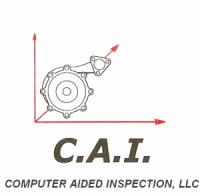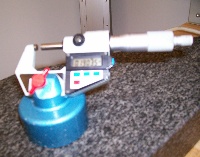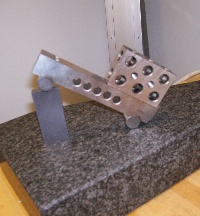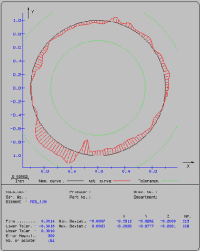|
|
FAQs |
- Q. What advantages can CMM inspection offer over open layout?
A. CMMs offer much greater inspection flexibility in that the part does
not have to be oriented in any specific way in order to carry out the
inspection. Open layout, for example relies upon a surface plate to
orient the part--which works fine for simple uni-directional checks.
Often, however, features to be inspected are at oblique angles relative to
datum surfaces. These type of setups are complex, if not impossible with
open layout.
- Q. The manufacture of a valve body involves drilling a .020 diameter hole
whose position is controlled tightly. How can such a feature be inspected?
A. On features that are too small to probe directly, a snug-fitting ground pin
can be inserted. The inspection can then be carried by inspecting the
outside of the pin to represent the feature.
- Q. A requirement of one of my customers is that I track SPC data. Can you
help?
A. Certainly. The CMM is well-suited for collecting SPC (Statistical Process
Control) data. The software is integrated with MicroSoft Excel and is compatible
with a wide variety of statistical software.
- Q. I measure a pin with a micrometer and it checks "in tolerance". However, our
CMM rejects the pin's size as "out of tolerance". What gives?
A. A direct reading with a micrometer does not take into account form
error (any out-of-roundnes condition the pin might have). A CMM measures the pin
using many points (statistically significant) and then computes the functional
diameter. Algorithms include Maximum inscribed, minimum circumscribed or any of
several varieties of least-squares computations.
- Q. Since you have to program the CMM for every part that is inspected,
how can I expect a rapid turn-around on inspection projects I send you?
A. Programming a CMM often involves repeated steps which lend themselves well
to "copying and pasting". The program can be exported as a text document--which
can then be editted with conventional word-processing software. Also, the
software uses "feature recognition" which allows direct measurement of features
which are then hard-coded into the evolving program--it's a cinch!
|
|







